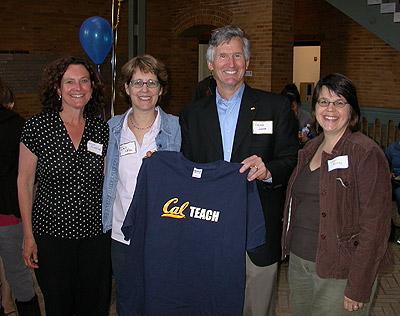Berkeleyan
 |
Cal Teach program adviser Winnie Froehlich, principal investigators Deborah Nolan of statistics and mechanical engineering professor George Johnson, and program director Nicole Nunes. |
College students take to the K-12 classroom
Cal Teach program promotes the development of badly needed science and math teachers
![]()
| 31 October 2007
Science and math education in the United States may be viewed as flawed experiments lately, but some 200 Berkeley students majoring in math, science, and engineering may help fix that through a new program promoting the teaching of these crucial subjects.
The students have signed on for various components of the Cal Teach program, a joint venture between the University of California and California State University systems, state government, and industry leaders. Its goal is to help alleviate the state's continuing shortage of science and math teachers by getting 1,000 new teachers from those fields into K-12 classes in California by the year 2010.
"We thought it was going to be a very tough sell, but students are turning out in droves," says Mark Richards, executive dean of the College of Letters and Science, dean of its division of mathematical and physical sciences, and a professor of earth and planetary science.
For math and science students who could earn a bachelor's degree at Berkeley and go on to land jobs at Google with higher salaries than their professors, choosing teaching might seem counterintuitive, says Richards. But these students will enter the working world with science and math diplomas as well as hands-on experience in teaching, he says, adding, "They're not cutting off career options; they're expanding them."
Cal Teach started its second full academic year at Berkeley this semester, and Nicole Nunes, the program coordinator on campus, says interest is strong among the incoming freshman and transfer students in math, engineering, and science who are alerted about the program.
"A lot of people come to Berkeley because they like learning, and that's basically why they want to teach," says Nunes, who earned a Ph.D. in physical chemistry before spending a decade teaching high-school chemistry and physics in Bay Area public and private urban schools.
The Cal Teach website (calteach.berkeley.edu) notes that just 4 percent of California's ninth-graders now go on to earn a bachelor's degree in science, math, or engineering, and that nearly 1,500 math and 800 science classes in California high schools were taught in 2002-03 by uncredentialed teachers. Even more courses were taught by someone with a credential unrelated to those fields.
Some Berkeley students are attending Cal Teach workshops that advise students about how to obtain teaching credentials after they finish their undergraduate studies; others are enrolled in undergraduate classes on how to teach science and math. Questions from Cal Teach students generally focus on what it takes to motivate students, how to manage a classroom, and how little money teachers earn. The latter, says Richards, will remain a roadblock to getting more and better teachers in the classrooms until schools and taxpayers opt to increase compensation.
Getting a taste of teaching
The program gives students first-hand experience by dispatching them a few hours each week to work with mentor teachers in schools in Berkeley, Oakland, Emeryville, and Concord for "a taste of what it's like to teach," says Nunes. They also receive a small stipend for their assistance with lesson plans, classroom demonstrations, and more.
The Berkeley students also provide support by running small-group tutorials for students who may lack basic skills, helping those with learning disabilities, and assisting with other activities. Richards notes that there has been positive feedback and high demand for Cal Teach help from school administrators, principals, and teachers.
"I've had some great experiences in the Cal Teach program," says Brian Ikkanda, 19, a Cal Teach participant majoring in chemical biology and minoring in education. "I've learned a lot about the different aspects of teaching, from the theoretical to the practical. Most of my involvement included helping out the students individually or in groups with specific assignments. I was also able to just interact with the students and get a feel for how they think."
Sarah Salazar teaches sixth-grade math and eighth-grade algebra at CAL Prep, an Oakland charter school with an emphasis on college preparation that is a partnership between Aspire Public Schools and Berkeley. Cal Teach students serve as role models there, she says: "My middle-school students get exposure to college kids who often look like and sound like them. Many of them don't have adults in their families who attended college, and these college students are important because they show it's possible."

